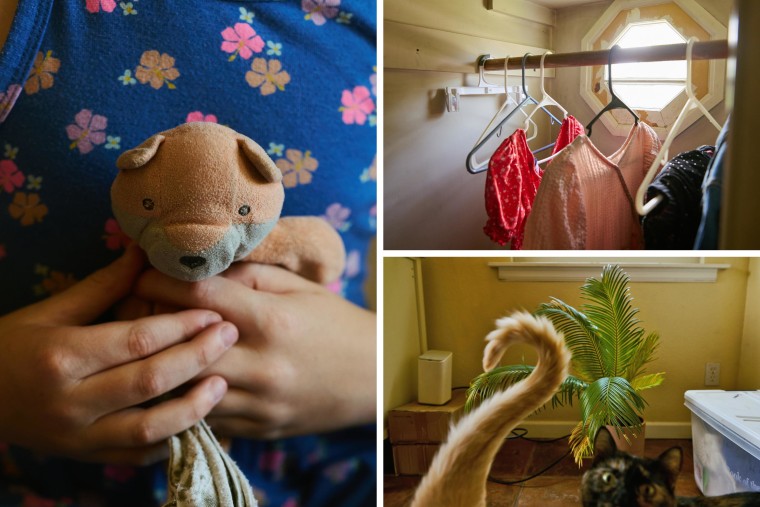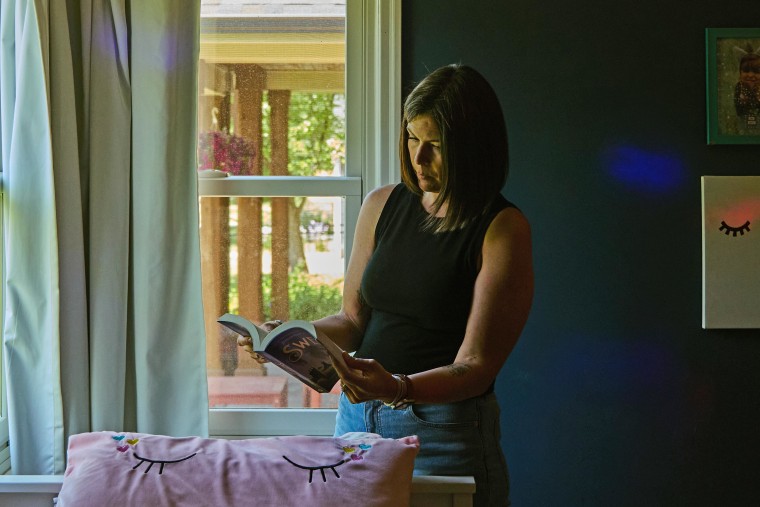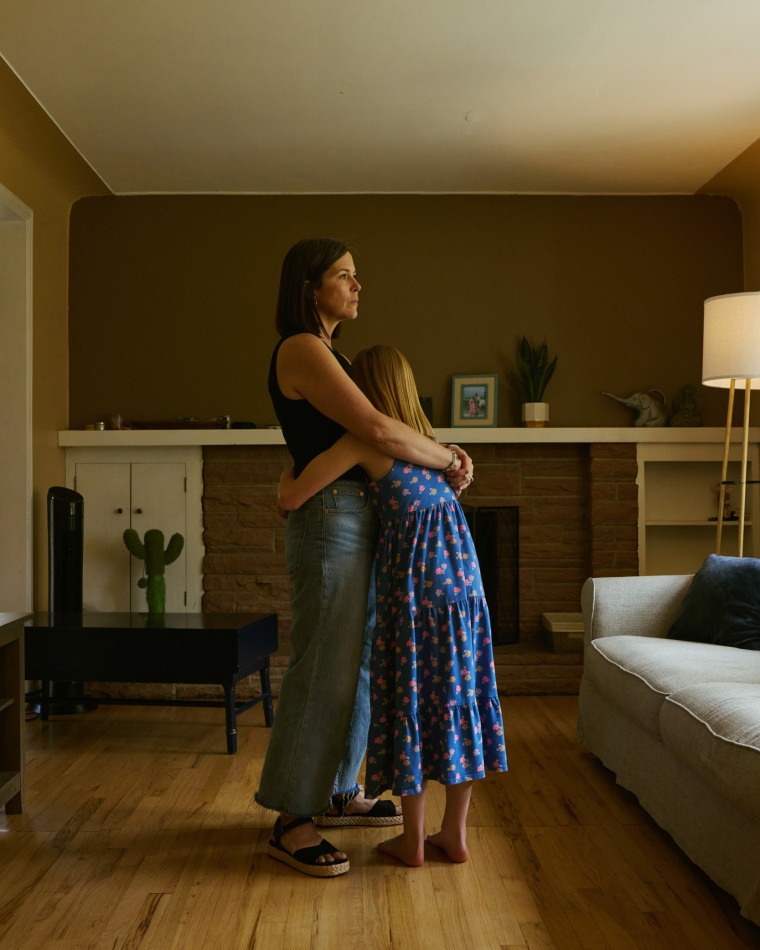These families say they’re leaving the U.S. because of its anti-transgender climate
Chase, a 9-year-old trans girl, sits with her parents, Candace and Brandon, as their family prepares for a life-changing move to New Zealand. Jimena Peck for NBC News
Denver parents Brandon and Candace are spending tens of thousands of dollars to move to New Zealand in July. The reason, they said, is to protect their 9-year-old transgender daughter, Chase, from the effects of the Trump administration’s policies and an increasingly hostile climate for trans people in the United States.
“You’re taught to believe, or indoctrinated, I suppose, in America that this is the land of the free and promise and all of that, and for my child’s rights to be stripped away for just being herself is gross,” Candace said, adding that she and her family feel like they have “no control over” their future in the United States.
Brandon and Candace, who agreed to speak on the condition that their last names not be used to protect their family from harassment and threats, are one of five families interviewed by NBC News who have either already left or plan to leave the country as a result of federal and state policies targeting transgender people and their health care. The families described fears of increased anti-trans violence and losing access to health care and identification documents that reflect their gender identities.

During Donald Trump’s first presidential term, many trans people talked about leaving the country, according to Sydney Duncan, a lawyer for Advocates for Trans Equality, the country’s largest transgender rights group. However, few people actually did.
Trump’s second term has had a more immediate effect on trans people and their rights because of several executive orders he issued this year. The orders, many of which are blocked in court or have faced lawsuits, have prohibited federal funds from going to hospitals that provide transition-related care to minors, barred trans women and girls from competing in female sports in K-12 schools and colleges, blocked trans people from getting passports that reflect their gender identities and banned trans people from military service.
But while an increasing number of trans people are deciding to leave the United States, Duncan cautioned that it still isn’t a widespread trend.
“The reality is that a lot of people of trans experience don’t have the resources to travel or to escape the policies of this administration,” Duncan said.

‘We were supposed to be safe here’
Brandon and Candace said their fears of having to leave the country were realized just 13 days into Trump’s second term. That is when Chase’s medical team at the Children’s Hospital Colorado told them it could no longer provide transition-related medical care to anyone under 19 because of an executive order Trump issued that barred research and education grants from going to hospitals that provide such care to minors.
The couple were shocked, in part because Colorado is among about a dozen states that have passed “shield” laws intended to protect access to trans health care, they said.
“Our reaction was we were supposed to be safe here until we left,” Candace said. “And immediately, we weren’t.”

The hospital resumed care for minors in February after a federal judge blocked the order from taking effect, but Brandon said that didn’t provide them with much relief, in part because the Supreme Court is expected to issue a decision in the coming weeks in a lawsuit against Tennessee’s ban on transition-related care for minors. That decision could have an immediate effect on the validity of Trump’s executive order and on access to trans health care for minors and adultsnationwide.
Some parents told NBC News that if the court allows the law to stand, they fear Trump will try to declare all transition care for minors child abuse and direct the attorney general to investigate parents who have been vocal advocates for their trans kids, similar to what Republican officials in Texas did in 2022. Trump issued a proclamation in April for Child Abuse Prevention Month declaring “the sinister threat of gender ideology” one of “the most prevalent forms of child abuse facing our country today.”
So far, Chase hasn’t received any transition-related care other than therapy and regular checks at the hospital to monitor for when she starts puberty. However, she is likely to consider it in the near future, and Brandon and Candace said they don’t want to raise her in an environment in which she hears negative rhetoric about trans people from elected officials.
Chase loves playing soccer and skiing, and she keeps what the family calls a “pillow library” — a collection of four to five books under her pillow that she reads after they put her to bed. Chase said she feels both happy and sad about moving, because she doesn’t want to leave her friends, but she does want to try living somewhere new.

Asked in an interview with her parents whether she is aware of Trump’s policies regarding trans people, Chase, who is in the fourth grade, said, “I am very aware about what he has been doing to people like me, and how I feel about it is I hate it, because I think everybody deserves to have that care.”
Brandon and Candace said they chose New Zealand because Brandon loved it when he visited a few years ago, it is very LGBTQ-friendly, their kids will be able to speak the language, and its way of life is similar to Denver’s.
They began planning the move while they applied for jobs in New Zealand. On Tuesday, Brandon officially accepted a job as a sales manager at a winery in Queenstown. He should have an accredited employer visa in about four weeks, while visas for the rest of the family will take an additional two. Accredited employer visas allow people to stay for up to five years if they have received job offers from accredited employers, and they provide a path to permanent residence. It will also provide Candace with a partner visa that will allow her to work in New Zealand.
The family will leave the United States and begin 35 hours of travel to their new home on July 23. The winery offered a house on the vineyard for the family to stay for six weeks until they find a home to rent.
When Chase found out that Brandon had gotten the job at the winery, she burst into “tears of happiness,” Candace said.

“School’s ending next week, and then everything kind of gets real,” she said, adding that the entire family feels a mix of excitement and sadness about having to start saying goodbye to their lives in the United States.
They estimated that the total cost of moving their family — which also includes Chase’s older brother, a 90-pound dog and two cats — will be $65,000 to $80,000. That total includes one-way plane tickets for the family of four ($6,000); relocation services for their three pets, if they can afford to take all of them ($25,000); visa applications ($3,000); lawyer fees ($2,000); and required medical tests for the move that aren’t covered by insurance.
Candace organized a GoFundMe fundraiser with a goal of $50,000, in part because, she said, she felt bad asking for anything more. The money will go toward the expenses they’ve paid with their savings so far and to whatever they need when they arrive with only their clothing, sentimental items and ski gear. They’ve raised just over $6,500 and have already taken money out of one of their 401(k) retirement plans to cover some moving costs.

A pre-emptive departure
The Jackson family of Missouri left more than a year before the 2024 election. Debi Jackson’s child Avery, who uses they/them pronouns and is about to turn 18, became a prominent face in trans advocacy after they were featured on the cover of National Geographic in January 2017, when they were 9 years old.
The family lived in Kansas City for 15 years and often traveled to the State Capitol to testify against legislation targeting trans people. She said that after a series of difficult events — the Supreme Court’s overturning Roe v. Wade; a shooting at a school in Uvalde, Texas, that killed 19 people; and Missouri’s enacting a ban on gender-affirming care for minors — her kids asked her why they were still in the United States.
“In that moment, I realized they were just saying they wanted out completely,” Jackson said. “A big part of it was their fear over the escalation of violence that we could all tell was going to come, because for years they had been listening to the language about trans people become more and more dehumanizing and become more and more violent in the way it was presented.”
Jackson said she also knew trans issues would be important for Republicans in the 2024 election, and she feared that photos of Avery — which she said prominent right-wing figures in Brazil, France and Poland were already using in speeches and online — could be featured in Republican attack ads.
She said she also knew the family couldn’t afford to move to another state first and then leave the country if Trump won.
Just a few months later, in September 2023, Jackson packed up her family and moved them to a country in the European Union, which for safety reasons she declined to name. She said it took her two months to raise $15,000 online to pay to transport their four dogs to Europe and for an initial deposit to rent a home.
Jackson does consulting and freelance writing remotely and was able to get a digital nomad visa, which in some countries can provide permanent residency. Now settled in her new home, Jackson said she spends time each day answering some of the hundreds of direct messages she gets on social media from parents with trans children who want to move either to other states or out of the country entirely.
Jackson said many Americans don’t know, for example, that they can’t move to other countries, particularly in Europe, and apply for asylum because of their or their children’s trans status. No countries that provide asylum to LGBTQ peoplebecause of fears of persecution accept U.S. citizens through those programs. When people are denied asylum by one of the more than two dozen member countries in the European Union, they are also banned from re-entering all other countries in the E.U. except Ireland and Switzerland for two years if they are from what are considered “safe countries.”
“I spend a lot of time researching and replying to people,” Jackson said. “That’s really the way that I deal with stress and trauma, is by trying to actually be proactive rather than reactive.”

‘Life is starting again’
It’s not only trans minors and their parents who are making the move. Ohio couple Marina, 30, and Faye, 23 — who are both trans and requested that only their first names be used because of fears of being publicly targeted — are leaving the United States behind for Australia. Faye said one of the turning points for her was the Trump administration’s detaining and trying to deport people with valid visas and revoking the visas of foreign-born college students. Faye is an Australian citizen on a student visa, and Marina is a U.S. citizen.
The couple have to move before Marina turns 31 in August, because they plan to get work holiday visas, which are available only to those 30 and younger and would allow them to stay and work in Australia for up to a year. It costs $600 to apply, and applicants also have to show that they have at least $5,000 in their bank accounts. After that year is up, the couple have to decide whether they want to get married.
Marina said they’re looking forward to the stress of the move’s being over.
“Every time I look at my cat, I’m about to cry,” Marina said of their 10-year-old pet, which they have to leave behind until Marina’s sister can, they hope, bring her over after having completed Australia’s rigorous process to move animals into the country. “It’s really overwhelming. I feel like once we actually have our feet down on the ground in Australia, it’s definitely going to be sad and still a lot of emotion, but part of it’s definitely going to feel like life is starting again.”
As for Duncan, the Advocates for Trans Equality lawyer, she that said she and her wife, a college professor in Alabama, have talked about leaving the country but that one of the problems they’ve run into is whether there is a safer place to go.
“What does Canada look like in 10 years? Do they get to where we are now? Or do they learn from our mistakes here?” she said. “It just becomes a Rubik’s Cube of decisions to solve, and that’s exhausting.”